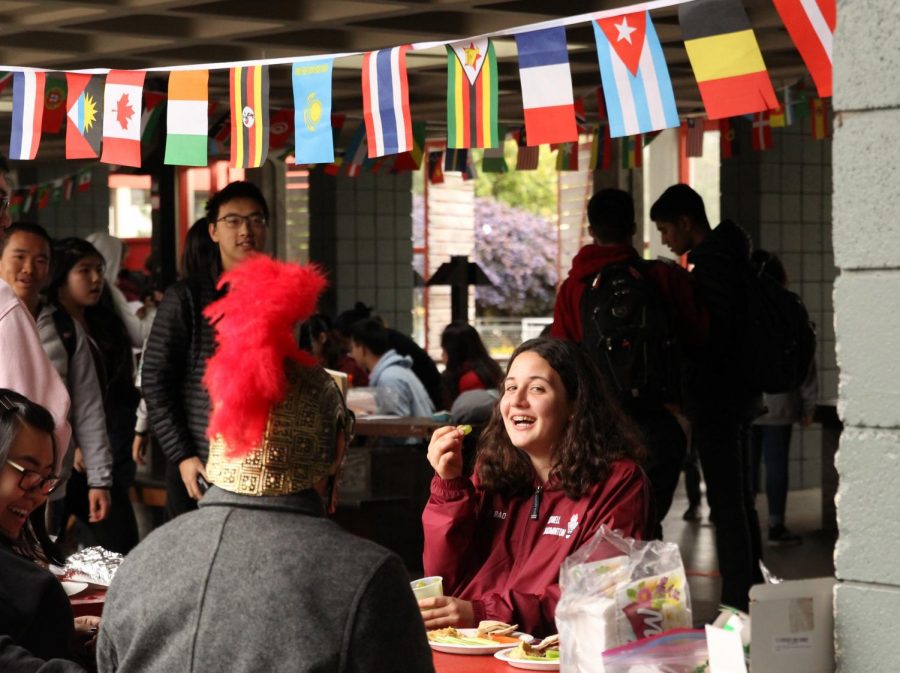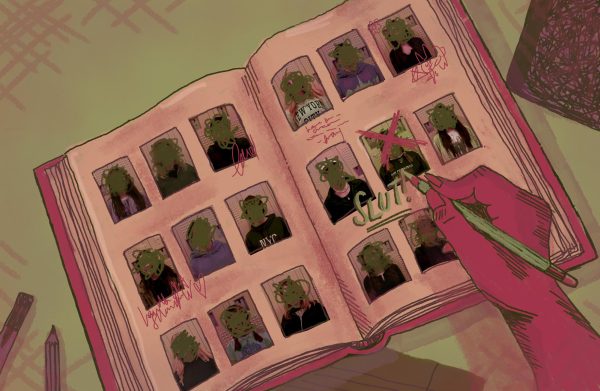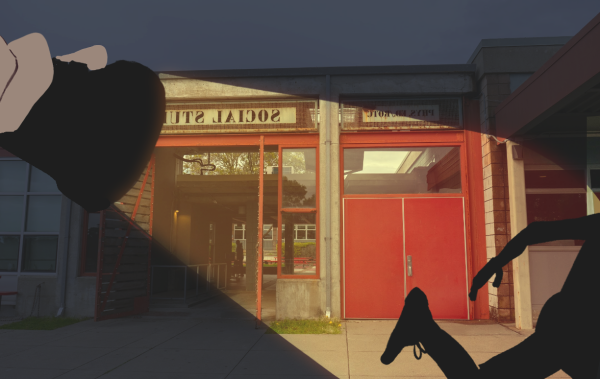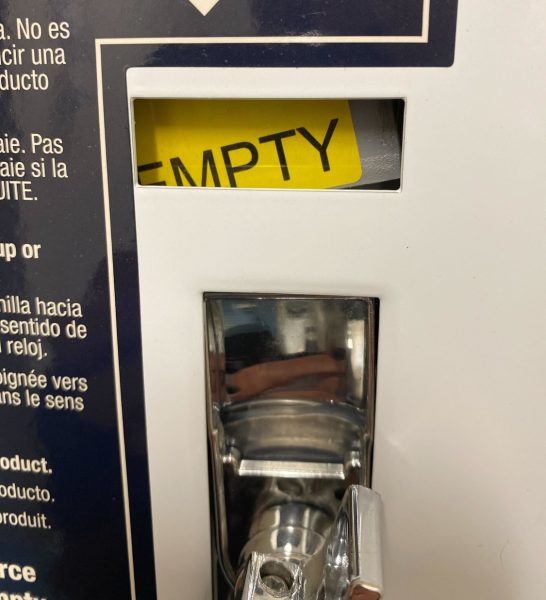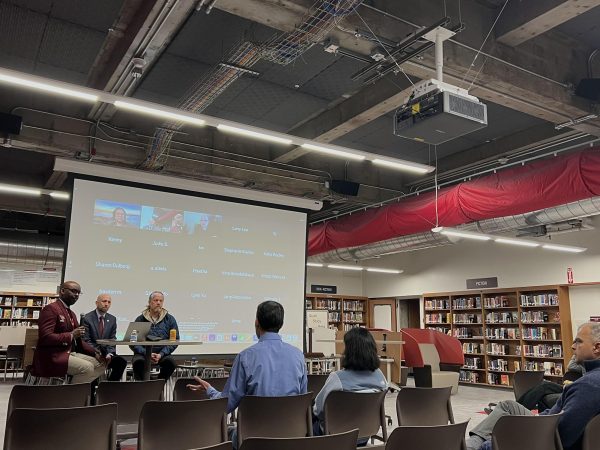Language festival name change: Kermesse to Globefest
Students enjoy Globefest beneath international flags.
Lowell’s language festival has been permanently renamed Globefest in order to rectify the anti-Semitic history of its former name, Kermesse.
According to World Language Department Head John Raya, this fundraising staple for the language program had been called Kermesse since its inception. Kermesse is originally derived from Dutch roots meaning “church” and “mass,” and has travelled across Europe as a term referring to various parties and gatherings in countries such as France. For approximately 50 years, Lowell unwittingly borrowed this festival name until Raya discovered its offensive connotation eight years ago.
Through his research, Raya discovered the original Kermesse celebration was held in honor of the Brussels Massacre in 1370. “I looked on Wikipedia to find out what Kermesse is,” said Raya. “And that’s when it hit.” As described by the Jewish Virtual Library, the massacre followed accusations of Jews desecrating the holy bread used for Eucharist and spiralled into violence towards the city’s Jewish population. “The Christians poured some gasoline on them and burnt them to death, and everybody jumped and rejoiced they killed the Jews,” Raya said. “And all of a sudden it became a tradition, celebrate killing the Jews for making something anti-Christian.”
Finding these facts deeply offensive to Lowell’s Jewish community, Raya voiced his concerns to others in the World Language Department. “Everyone in the department said. ‘Oh that’s the past, let it go!’” Raya said. Despite such dismissal, the name Kermesse still did not sit well with him. He proceeded to boycott the festival with support from students in his French classes.
Senior Mariel Goldberg, one such student, was shocked to learn about the history behind the name, and wondered why the school would even choose such an offensive title in the first place. She and her father, then Parent Teacher Student Association president Stan Goldberg, spoke to the former department head as well, but were met with the same response that Raya received. Mariel Goldberg was upset that former department head Xiaolin Chang didn’t understand the significance of the name, and felt helpless to change the situation. “I didn’t really know what to do because it seemed like nobody else really cared about it enough to change it,” she said. I thought that the Kermesse name was really important to bring up because people should know that there’s a history behind that name and it shouldn’t be ignored. — Mariel Goldberg
Last year, after years of boycotting the Kermesse, Raya became World Language Department Head, giving him the license he needed to accomplish his goal. “[Principal] Ishibashi said Mr. Raya, now that you’re the head of the department, whatever works for you,” Raya said. “So I changed it right away.”
The job of finding a new name for the event was taken on by students in the festival’s organizing committee, who quickly began brainstorming. According to current Globefest Committee president Fion Ho, the committee was not told why they needed to change the name, only that a new name was immediately necessary. Due to the tight timeline for planning the event, the committee’s name choices were not considered, and the World Language Department ended up overriding the students, choosing “World Language Festival” as a temporary solution. Ho soon realized that “all of us [students] were saying Kermesse instead of World Language Festival because, one, we were used it but, two, it was also a lot easier to say.” As a result, for this year’s event the Committee unanimously selected the new name “Globefest,” which Ho finds rolls of the tongue easier and is more interesting.
In addition to being catchier, both Raya and Ho feel “Globefest” captures the true nature of the festival much better than the prior two titles. While the name “World Language Festival” was only inclusive of the eight languages taught by the World Language Department, according to Raya, Globefest opens opportunities for cultural groups with languages not taught at the school to sell at the fair as well.“We want it to be inclusive, so the Russian kids are going to have a table, the Middle Eastern kids, and Fil Am is going to be at the festival too,” Raya said.
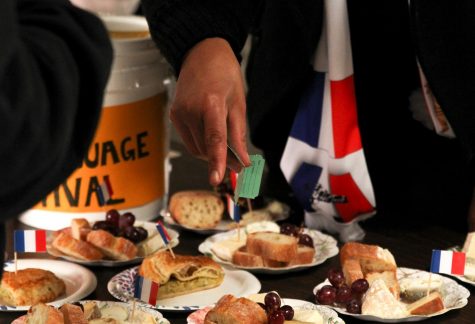
The French stall sells bread, cheese and grapes.
Though the new name Globefest offers the benefits of catchiness and inclusivity, after two recent name changes, many students are unsure of what to actually call the event. “Last year we had a lot of confusion,” Ho said. “People didn’t know what to call it, people called it World Culture Festival, and World Culture Fair.” Additionally, Goldberg has experienced instances in which her peers reverted to calling the festival Kermesse out of habit. These missteps do not phase Raya, who believes the transition “is just going to take time.” However, the lasting power of the name Kermesse is still evident throughout the school–even Lowell’s school website still refers to the festival as Kermesse on the World Language Department’s page.
Though changing the name of the festival was a fairly minor adjustment, both Goldberg and Ho agree that recognizing such naming insensitivities is very important. “It just makes sense,” Ho said. “We want Lowell to be a very welcoming place, and especially for the World Language Department, it should be our job to not be discriminating against anyone.” Goldberg feels that anti-Semitic acts are often overlooked, so creating this change was very important to her. “I think that we do a good job for a lot of other cultures at this school to recognize [microaggressions], and I think for Jewish culture it’s definitely overlooked,” she said. “I thought that the Kermesse name was really important to bring up because people should know that there’s a history behind that name and it shouldn’t be ignored.”




